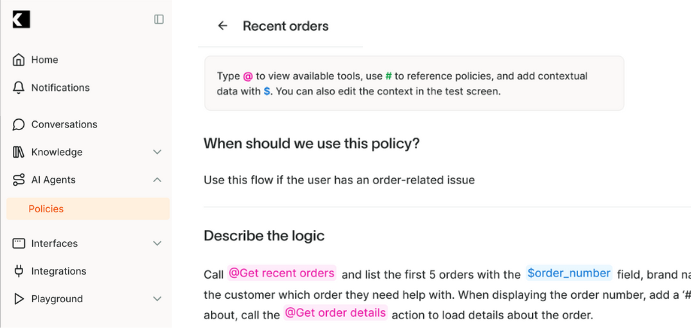Ingredients
The systems used by this policy include Shopify, Freshdesk, and Kodif.
What are AI Policies?

At Kodif, we’re excited to announce the launch of Policies—a powerful, dynamic solution designed to revolutionize the way CX managers handle customer support. Unlike traditional flows, which are rigid and complex, Policies empower non-technical users to create and manage customer interactions with ease. Written in natural language, Policies make it simple to define and refine customer experiences without needing to rely on complicated flowcharts or scripting. This approach is not only user-friendly but also self-serve, enabling CX teams to quickly translate existing Standard Operating Procedures (SOPs) into automation, saving valuable time and resources.
The flexibility of Kodif Policies ensures that businesses can offer personalized, context-driven support while continuously improving customer experiences. With Policies, you can experiment with different strategies to optimize outcomes such as CSAT, revenue, and retention—all without the need to rebuild complex workflows. Whether it’s automating routine interactions or testing new approaches for high-stakes scenarios, Policies provide a scalable, adaptable solution that aligns with your business goals. While flows still have their place in sensitive, high-risk situations, Policies offer an agile alternative that helps businesses innovate faster and deliver exceptional, tailored experiences at scale.
“Get order info” ticket type explained
In customer support, “Get order info” tickets are inquiries made by customers seeking information about the current status or details of their orders. This type of ticket is commonly associated with WISMO (Where Is My Order) queries, where customers are eager to know the progress of their shipment, estimated delivery times, or any tracking details available. Addressing these tickets efficiently is crucial, as it directly impacts customer satisfaction and trust in the brand. By responding promptly and accurately, businesses can enhance the customer experience and reduce the burden on their support teams.
Which Platforms does this AI policy work on?
This AI policy works seamlessly with Shopify, Freshdesk, and Kodif. Additionally, Kodif integrates with all other major platforms, ensuring broad compatibility and ease of use across different systems.
When should I use this policy?
Use this policy when customers want to know the status of their orders. The policy is particularly useful for handling WISMO inquiries, as it provides a structured approach to fetching and delivering order details efficiently. By automating these interactions, businesses can reduce response times and improve overall customer satisfaction.
Policy logic
Type @ to view available tools, use # to reference policies, and add contextual data with $. You can also edit the context in the test screen.
- Ask for the user’s email address:
- Use @get_shopify_account_details tool to check if the user with that email address exists in Shopify.
- If the email address was not found, ask for a valid email address.
-
If the email address is still not found, route it to an agent for further investigation.
-
Display Recent Orders:
- Use @get_shopify_orders to retrieve the user’s recent orders.
- Display the list of recent orders and ask the user which specific order they would like to inquire about.
-
If the order was not found, route to an agent for further investigation.
-
Check Order Status:
- For the selected order, retrieve the shipping status using @shopify_order_details(order_id: str).
- If “Approved”, inform the customer that the order was approved and is waiting to be processed.
- If “Processing”, inform the customer that the order was processed and is waiting to be shipped.
- If “Pending Shipment”, inform the customer that the order is pending shipment and provide a shipment date.
- If “Shipped”, inform the customer that the order was shipped and is waiting to be in transit and provide the tracking number.
- If “In transit”, use the tool @shopify_order_details to check if the order is within the estimated delivery date. If yes, inform the customer that the order is in transit and provide the expected delivery date. If no, inform the customer that the route is delayed and that the request will be transferred to an agent for investigation.
- If “Delivered”, inform the customer that the order was delivered and confirm with the customer if the order was delivered.
- If the order was not delivered, route to an agent or create a ticket to escalate for further investigation.
- If “Canceled”, inform the customer that the order was already canceled.
Example policy
Use this policy when customers want to know the status of their orders. The logic follows a similar structure to the “Get order info” policy, utilizing specific tools and platforms like Shopify and Freshdesk.
- Ask for the user’s email address:
- Use @get_shopify_account_details tool to check if the user with that email address exists in Shopify.
- If the email address was not found, ask for a valid email address.
-
If the email address is still not found, route it to an agent for further investigation.
-
Display Recent Orders:
- Use @get_shopify_orders to retrieve the user’s recent orders.
- Display the list of recent orders and ask the user which specific order they would like to inquire about.
-
If the order was not found, route to an agent for further investigation.
-
Check Order Status:
- For the selected order, retrieve the shipping status using @shopify_order_details(order_id: str).
- If “Approved”, inform the customer that the order was approved and is waiting to be processed.
- If “Processing”, inform the customer that the order was processed and is waiting to be shipped.
- If “Pending Shipment”, inform the customer that the order is pending shipment and provide a shipment date.
- If “Shipped”, inform the customer that the order was shipped and is waiting to be in transit and provide the tracking number.
- If “In transit”, use the tool @shopify_order_details to check if the order is within the estimated delivery date. If yes, inform the customer that the order is in transit and provide the expected delivery date. If no, inform the customer that the route is delayed and that the request will be transferred to an agent for investigation.
- If “Delivered”, inform the customer that the order was delivered and confirm with the customer if the order was delivered.
- If the order was not delivered, route to an agent or create a ticket to escalate for further investigation.
- If “Canceled”, inform the customer that the order was already canceled.









